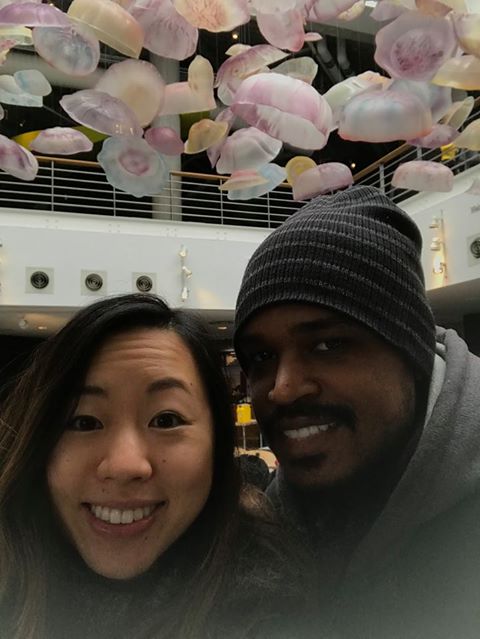I met Jing and Darryl during a trip to the aquarium. My sister and I had used the aquarium’s Dollar Day as a sort of networking event and I didn’t imagine that I would meet anyone to interview while there. Our meeting went through the stages of, “What a great deal it is to go to the aquarium for just a dollar, although it’s so busy and crowded!” and “How early did you get here today?” to “How early do you usually wake up?” to “What do you do?” which is when I learned about the nonprofit Jing founded organization called The MindReset.
Jing is a highly-abled and functional traumatic brain injury survivor and Darryl suffers from epileptic seizures. Both individuals view themselves as outside the norm of society due to how people respond to them once they find out about their respective conditions. Although when I was talking with both of them I wouldn’t have known that either of them had such conditions if Jing were not so passionate about destigmatizing and changing people’s perceptions of individuals with traditionally marginalized conditions and identities.
Here are each individual’s responses to the four interview questions:
DARRYL:
- “What is the meaning of life?” “I would say the meaning of life is…. I mean, the meaning of life is mystery. Life, in so many ways is completely mysterious.”
- “When was the saddest moment of your life?” “When my mother passed in ’96 [when I was six]. Due to the fact it was so long ago it’s hard to remember. It was sad because a lot of kids had parents but I was one without [a mom].”
- “What is the biggest struggle you face?” “My epilepsy is something that people don’t understand. It’s affected me over the years. Especially family. They don’t know how to deal with it [knowing that I might have an epileptic seizure at any moment]. And that’s the hardest part about it. The thing is that if I bring it [my epilepsy] up, they [my friends and family] know that it’s something that could happen at any moment… But people don’t know how to deal with it. They feel sad or frustrated [for me].”
- “If you could give one piece of advice to a large group of people, what would it be?” “Give people a chance. Look it [epilepsy] up for yourself. It’s definitely online if you’re curious to know more about it. Find out for yourself. [And also that] we’re still people. Even though this illness has conditioned [others to think about us in a certain way] … people in our lives don’t treat us as human. They treat me like a child in a 28 year old’s body. [What I want is for people to] treat me like an adult because I am one.”
JING:
- “What is the meaning of life?” “I think that’s a tricky one because it’s different for different people. It’s something I developed into and had to think about a lot because suicidal ideation was a part of my journey. So I had to figure out what my meaning was. Currently I would have to say the meaning of life is people because they inspired me and that’s what drives me. I made a promise on my journey to figure out how to find a way to take them with me – to return the kindness that was given to me during my healing journey. It’s about finding your purpose and having something to strive for. I don’t feel comfortable leaving this world until I have done that.”
- “When was the saddest moment of your life?” “A lot of things in life are sad…. They aren’t about what are the worst or best [moments]. I had a lack of emotion as a symptom of my brain injury. I didn’t recognize sadness until about 3 months after my brain injury. Since I had chronic pain also it was difficult to differentiate whether I was sad or if I was just in pain.
“Moments that were strikingly sad were when people have died. I would behave in the way that people would when people were sad. Like when my grandpa died on my birthday. I didn’t know if I could grieve for people until then.
[Just yesterday I found out that] one of my friends passed away. I got a text yesterday morning. A friend shared that one of our friends died and I just cried. It weirded me out that I wouldn’t see this person again. Other funerals I’ve gone to are sad moments in my life. Death is sad.”
- “What is the biggest struggle you face?” “What’s my greatest struggle? There isn’t a single struggle that sticks out. I think it’s a combination of the struggles that makes up the biggest struggles. If you asked me the same question during different parts of my stages of my healing journey I would answer differently.”
“For instance, learning how to walk, learning to read, and learning how to study were all things that were struggles during earlier parts of my healing journey. So over time these things have now gotten easier.
“Over time it’s [my struggles have] been about understanding and waiting for other people to figure out or recognize that they create stereotypes about me based off of knowing about my brain injury as I’m very open about my brain injury. [Now my biggest struggle is to have] patience for other people to getting there. I have a combo kid/adult mind. That’s confusing. [I’ll call it a] memory condition. I don’t want to call it a disorder because it isn’t all bad. An example of how people make assumptions about my memory condition is that they will repeat things many times to me once they find that out, whether or not they really need to. I just socialize a little differently than other people.
“A good example is that sometimes I don’t feel comfortable with my brain injury when people try to figure out what to compare me to. They don’t know how to categorize me. Sometimes people will treat me differently once they find out. They feel uncomfortable when they don’t have a full understanding about it [and] it’s difficult [to adjust to] when I grow so quickly and change so quickly.
“Trust, intimacy, and building social visibility [are some of the things I’m working on].”
“If you could give one piece of advice to a large group of people, what would it be?” “Stop asking about “How did [the traumatic brain injury] happen?” That’s more for the curiosity of the asker than it is for the person being asked. Why would a person want to be asked about the most traumatic event in their life? Some of my peers [with brain injury] enter our population through domestic violence or other violent means that are out of their control. Most people with brain injury didn’t intend for it to happen, but even if there was self-harm involved, this shouldn’t matter. Supporting individuals to get out of their struggle is more important.
“On the flipside, things that they could ask or say, depending on the context include:
“How can I best support you within my means?” It’s a broad question and it encourages the person to advocate for themselves as sometimes their need is so high. Lots of people with TBI feel very guilty and that they are a burden to others because they have to be taken care of. As for their caretakers, not a lot of people have the capacity to be able to take care of themselves as well as another person’s wellbeing.
“Also, this statement “within my means” helps to set boundaries in some ways. You don’t want that person to be over reliant on others.
“When I’m talking to patients [with traumatic brain injuries I tell them:] “You need to stand up for yourself. It doesn’t hurt to ask for help. Teach other people to advocate for you. Teach others what would be helpful to you, everyone who you’re close to so that they don’t feel weird sharing about your condition.” Those are just some communication points that are helpful to others.
“The reality of the world is that people do make assumption and stereotypes and it’s up to us to openly talk about it [our conditions and disorders] to help others understand what we’re going through.”
At the end of the interview I asked for a photo, which the two were very happy to take and I didn’t feel like it was anything out of the norm of what I would do, as I frequently chat with people and ask for photos of them or for their information if we had a good conversation or made a good connection. Jing also offered a business card and talked about various events as well as the nonprofit’s website at https://www.themindreset.com/.
Written by: Annie Vu
Edited by: Jing Wu

Please do not hesitate to reach out to the MindReset community if you are in need of support or are interested in supporting others in an actionable and effective way.
The MindReset is a community of individuals who seek to inspire a social movement geared toward creating a more Supportive, Inclusive, Compassionate, and Kind society where anyone and everyone has the opportunity to thrive.
FOLLOW US:
- Facebook: https://www.facebook.com/theMindReset/
- Instagram: @The_MindReset
- Twitter: themindreset
- Youtube: The MindReset
- LinnkedIn: The MindReset
- #TheMindReset #TMR #SICK
- e-mail: themindreset@gmail.com


